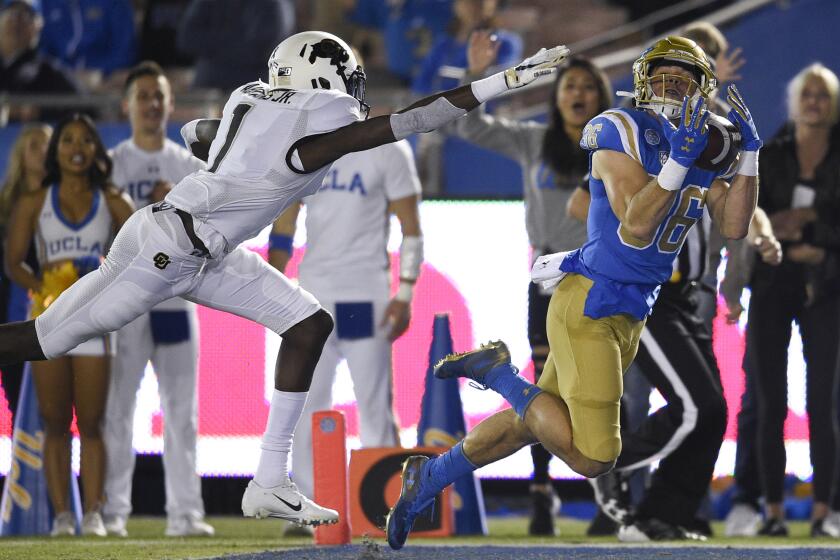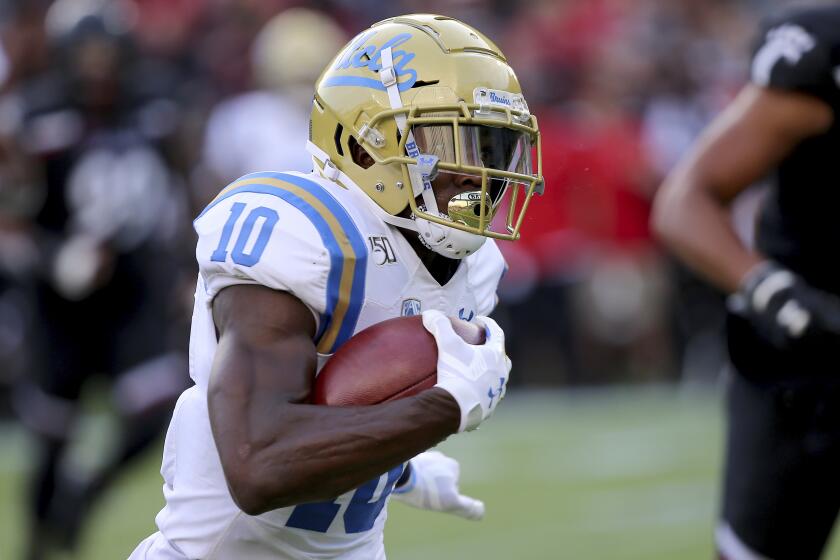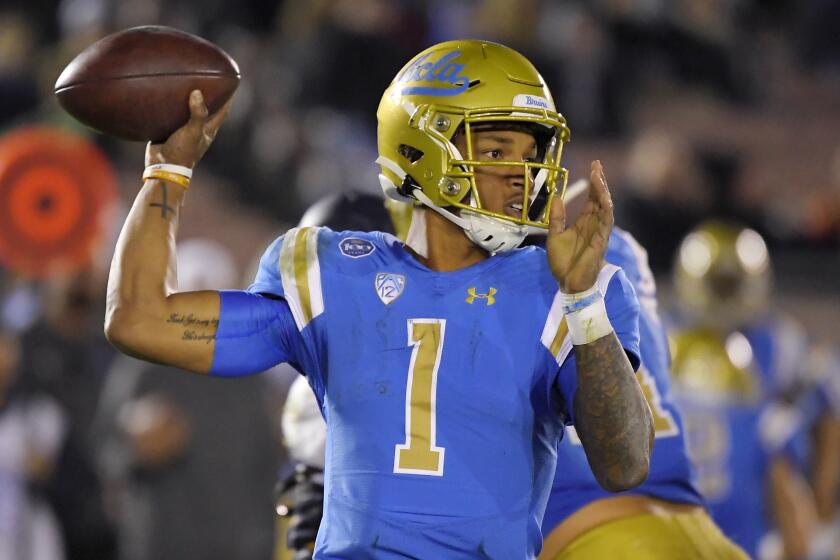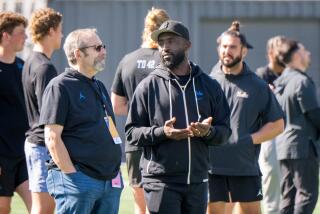UCLA coaches have found matching Terry Donahue’s success an elusive goal
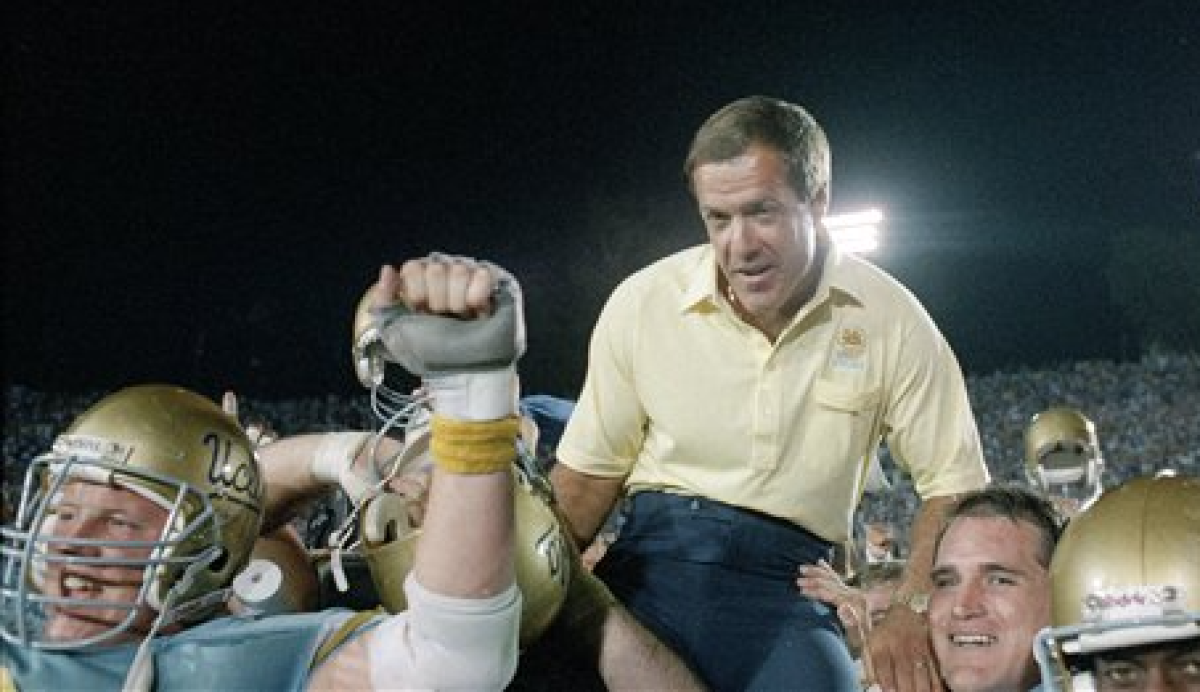
- Share via
It will be a reminder of the fleeting highs followed by sustained frustration that has tormented UCLA football with every coaching hire in the quarter century since Terry Donahue’s departure.
On one sideline will stand Karl Dorrell, a throwback to when the Bruins did most everything on the cheap and had the results to match.
On the other sideline will stand Chip Kelly, whose school-record $23.3-million contract was supposed to trumpet a new era but has led only to lavish disappointment.
UCLA’s season opener against Colorado on Saturday at Folsom Field in Boulder will symbolize the Bruins’ failures in their search for the next Donahue, who logged a school-record 151 victories over 20 seasons and became the Pac-12’s winningest coach with 98 conference victories.
The Bruins have churned through five coaches since Donahue left in 1995, posting losing records in 11 of 24 seasons, while appearing in (and losing) just one Rose Bowl. The program hasn’t been consistently relevant nationally since appearing in (and winning) seven consecutive bowl games under Donahue, including three Rose Bowls.
The Bruins open the season on a week when the practice schedule was altered by the election, then they play two consecutive weeks on Friday night.
Since then it’s been a jumble of losing seasons and Las Vegas Bowls.
“It’s not been the glory years, I’ll tell you that,” Rick Neuheisel, who went 21-29 in four seasons with the Bruins, said with a chuckle.
A former UCLA quarterback who led the Bruins to victory in the 1984 Rose Bowl under Donahue, Neuheisel returned to his alma mater after prosperous coaching stints at Colorado and Washington that included another Rose Bowl triumph with the Huskies.
His success with other Pac-12 schools and failure with the Bruins raises a question: Is there something about UCLA that makes it harder to win than it should be given a sturdy recruiting base, sterling academic reputation and shorts-in-January weather?
“Oh, I think it’s too coincidental for it not to be a little systemic,” Neuheisel said of UCLA’s struggles.
“They were very patient with Terry Donahue... . College football was a little bit more forgiving in the sense that there wasn’t social media.”
— Former UCLA assistant coach Gary Bernardi
Neuheisel prefaced what he was about to say next with a disclaimer because he didn’t want it to sound like he was making excuses for his own shortcomings, which he felt were exacerbated by a lack of support from the administration.
“I just think that you have to make a decision as an athletic department within a university community as to what level of importance you’re going to place on it and, are you willing to do the things that those who deem the football program hugely important are willing to do?” Neuheisel said, ticking off Alabama, Clemson and Ohio State as examples of fiefdoms that have made football king.
As evidence of UCLA’s differing expectations, Neuheisel retold the story of the school’s marketing department buying a full-page newspaper ad upon his hiring in 2008. The ad declared that the football monopoly in Los Angeles was over, a not-so-subtle reference to USC’s dominance under coach Pete Carroll.
Neuheisel added a never-before-told postscript, saying that Dan Guerrero, UCLA’s athletic director at the time, apologized afterward, explaining that he didn’t want to put too much pressure on a new coach.
UCLA’s two-deep chart revealed 22 players who have been with the team since coach Chip Kelly’s arrival, sparking hopes for a fast start when the season opens Saturday.
“His point was, ‘We’re not a program that’s going to win 10 [games in a season]. We’re a program that if we can just get to win six or win seven, then we’ll see where we can go from there,’ ” Neuheisel said. “And I remember walking out of that office going, ‘We have a problem.’ ”
Guerrero, who hired every coach that has followed Donahue besides Bob Toledo, declined to comment for this story. If six- and seven-win seasons are the marker of success, then UCLA undeniably thrived under Guerrero before his retirement in June, logging five of the former and two of the latter.
The Bruins have enjoyed pockets of more satisfying success since Donahue retired from coaching. Toledo posted a school-record 20-game winning streak from 1997-98, the Bruins one disputed Brad Melsby fumble in the pre-instant replay era away from playing in the first Bowl Championship Series title game.
Jim Mora looked like he might be the next great UCLA coach when he won 29 games in his first three seasons before suffering a precipitous decline leading to his dismissal in 2017. Even Dorrell, who declined to comment on his UCLA coaching tenure, went 10-2 in 2005 before regressing considerably over his final two seasons.
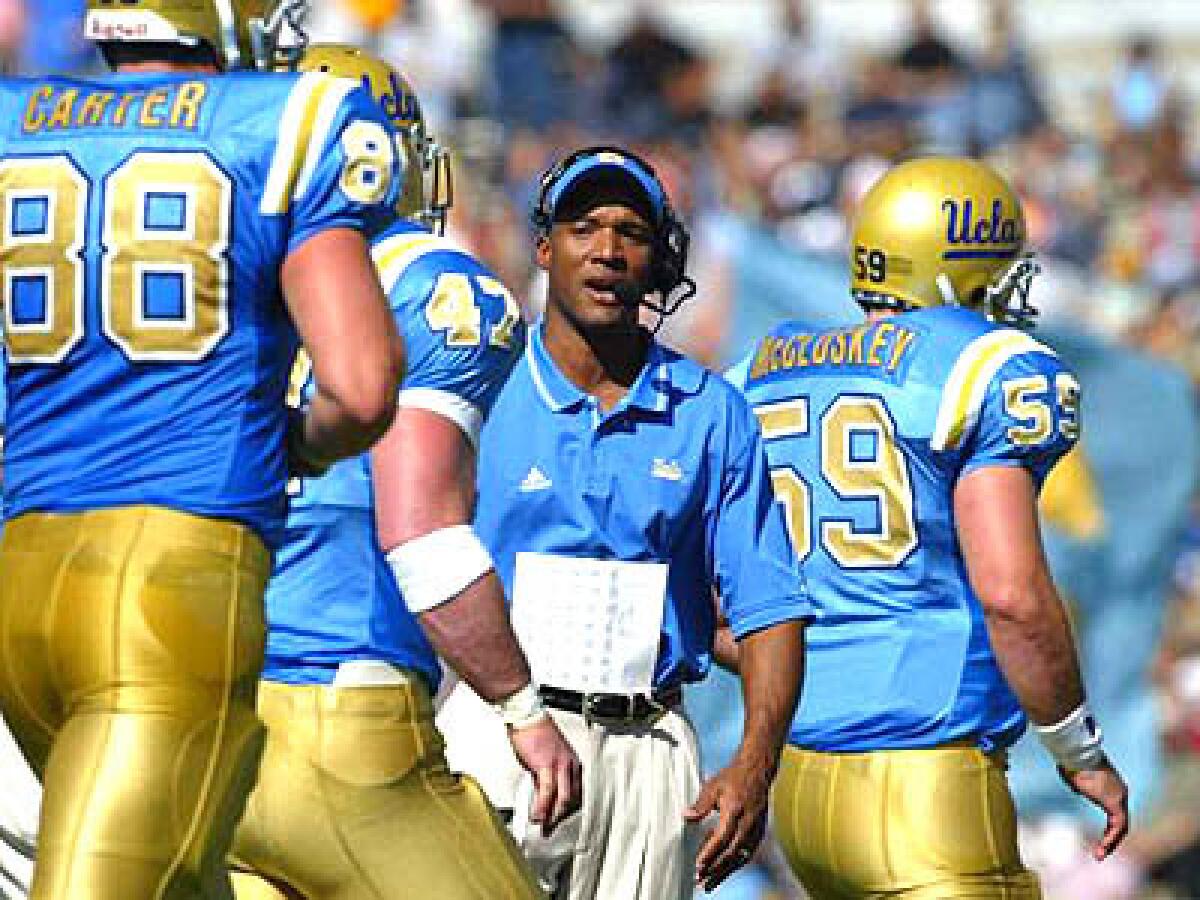
Sustaining success wasn’t easy for Donahue either, at least not at first.
An assistant promoted to replace Dick Vermeil at age 31, Donahue won nine games in his first season but persevered through some early struggles, including four consecutive losses to USC. The backing of Charles E. Young, the Bruins’ chancellor at the time, helped Donahue ignore the howls of those calling for his job.
“They were very patient with Terry Donahue, the administration, because he was such a great representative of UCLA and he was able to put together a real good staff of teachers,” said Gary Bernardi, a former longtime Bruins assistant coach who worked under Donahue, Toledo and Dorrell. “College football was a little bit more forgiving in the sense that there wasn’t social media.”
Toledo said he didn’t enjoy similar support after Guerrero arrived in April 2002. The new athletic director fired Toledo eight months later despite Toledo’s historic early success and the Bruins winning eight games with a freshman-heavy roster during his final season. A series of public ordeals, including a handicapped-parking placard scandal involving 19 players, contributed heavily to Toledo’s dismissal.
Toledo said he was scapegoated by the scandal given that it also involved other UCLA teams out of public view.
“It wasn’t just football but we took the hit — I took the hit,” Toledo said, adding that Guerrero told him he wanted to bring in his own coaches.
Coaching longevity is increasingly rare across the Pac-12, Kyle Whittingham’s 16-year run at Utah an outlier in a conference where teams have burned through an average of 5.3 coaches since Donahue left UCLA. Bernardi said the pressure to extend scholarship offers to high school prospects earlier than in the past has led to more recruiting misses that have resulted in higher coaching turnover.
UCLA and USC also no longer have a stranglehold on players in their own backyard. Teams that regularly appear in the College Football Playoff have become magnets for top Southern California high school players, quarterback Bryce Young heading for Alabama and quarterback D.J. Uiagalelei enrolling at Clemson, among others who have left the area.
“You remember the old Batman series where you’d see the villain and Batman would always get in a fight and they’d put ‘Pow!’ and ‘Zap!’ up on the screen, but the villain’s lair was always tilted?” Neuheisel said. “It feels like that same tilt is toward these same schools that keep going to the Playoff.”
Donahue, now 76 and battling an undisclosed form of cancer, succeeded in part because he was a pioneer in national recruiting, enlisting Bill Rees to scour the country for talent while boosting the exposure his team already received from its nationally televised games. The Bruins snagged Jonathan Ogden from Washington, D.C., Kevin Williams from Texas and Eric Ball from Michigan.
Neuheisel’s UCLA demise might have come partially as a result of the star he landed but didn’t play. The coach refused to use quarterback Brett Hundley during his first college season in 2011 because Hundley was coming off a knee injury that had forced him to miss training camp. Hundley went on to spark Mora’s early success that included two 10-win seasons.
“If I have a regret, it’s that I never got to really coach Hundley,” Neuheisel said. “He was my recruit, he was a guy that I knew was going to be a great player; I should have probably played him even though he wouldn’t have played until the middle of the season.”
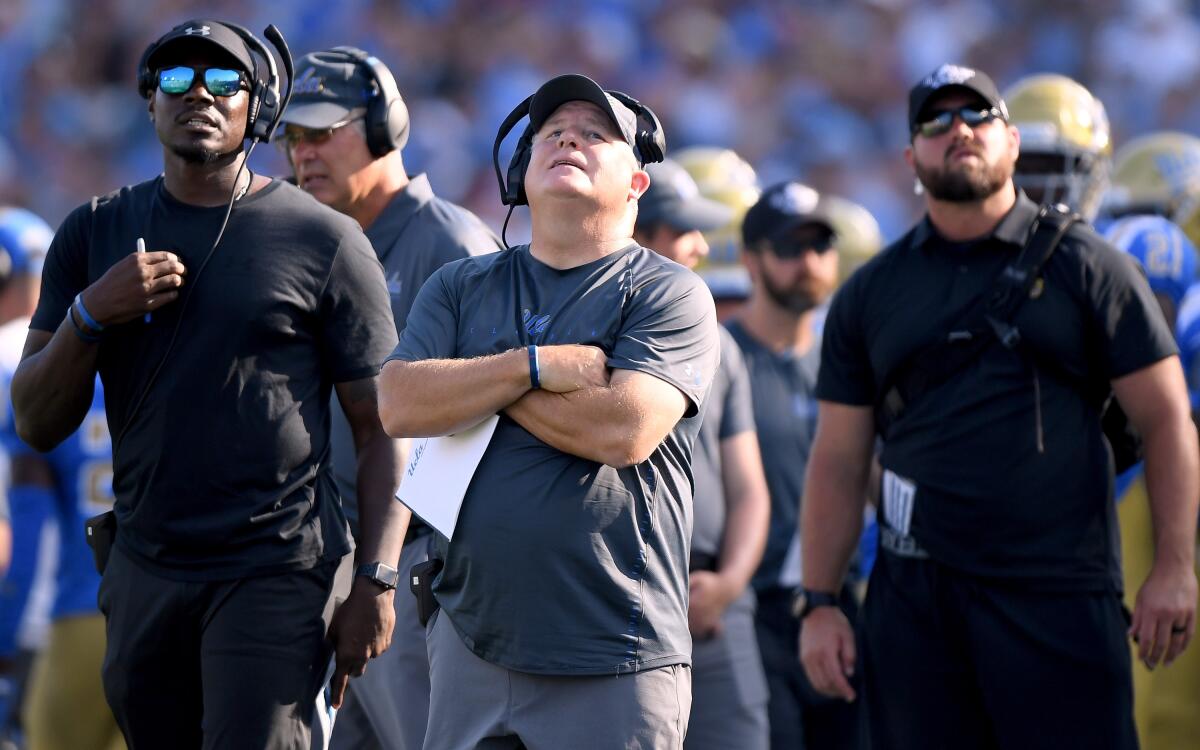
Kelly’s recruiting has been average by Pac-12 standards, most of his best players having been brought in by Mora. The lack of talent has been reflected in a 7-17 record that represents the worst two-year start of any UCLA coach since James J. Cline went 2-10-3 from 1923-24. Cline did not make it to a third season.
Kelly’s losses have come despite the usual-suspect UCLA excuses being off the table. The Bruins are no longer a chintzy operation known for handing out below-market contracts, mostly to coaches such as Dorrell and Neuheisel who had ties to the school. A novice head coach at the time of his UCLA hiring, Dorrell acknowledged after his debut that he didn’t know where to stand on the sideline.
UCLA has flexed new financial might in recent years, giving Kelly a record sum, constructing the $65-million Wasserman Football Center and spending $5.4 million on non-travel football meals during one fiscal year.
Kelly acknowledged the school had fully supported his bid to lead the Bruins to their first winning record since 2015.
“They’ve done everything,” Kelly said. “You look at the support that we get, they built a brand-new building just before we got here, we’re on the cutting edge when it comes to the scientific stuff we do in the weight room to nutrition, so there’s a lot of things that the school has done and I’m proud to be a part of this school.”
Kelly touted the academic standards that some of his predecessors lamented, calling them a positive. UCLA also recently created a master’s degree program in the school of education that has enrolled three graduate transfers.
Since Chip Kelly’s arrival as football coach in November 2017, the team has posted program bests for the number of Director’s Honor Roll recipients three times.
But something’s as wonky as the nearly empty Rose Bowl of recent seasons when considering where the Bruins were under Donahue and where they have been under his successors. Their best hope might come not in Kelly but new athletic director Martin Jarmond, who has stressed the importance of a thriving football program.
“Hopefully he can raise the kind of funds and get the kind of runway afforded him from those above him to build this as it should be built,” Neuheisel said of Jarmond, “because UCLA’s a special place and everybody will come look and there’s no reason it can’t be a launching pad for one of the big boys.
“But you have to make the determination you want to be one.”
More to Read
Go beyond the scoreboard
Get the latest on L.A.'s teams in the daily Sports Report newsletter.
You may occasionally receive promotional content from the Los Angeles Times.

